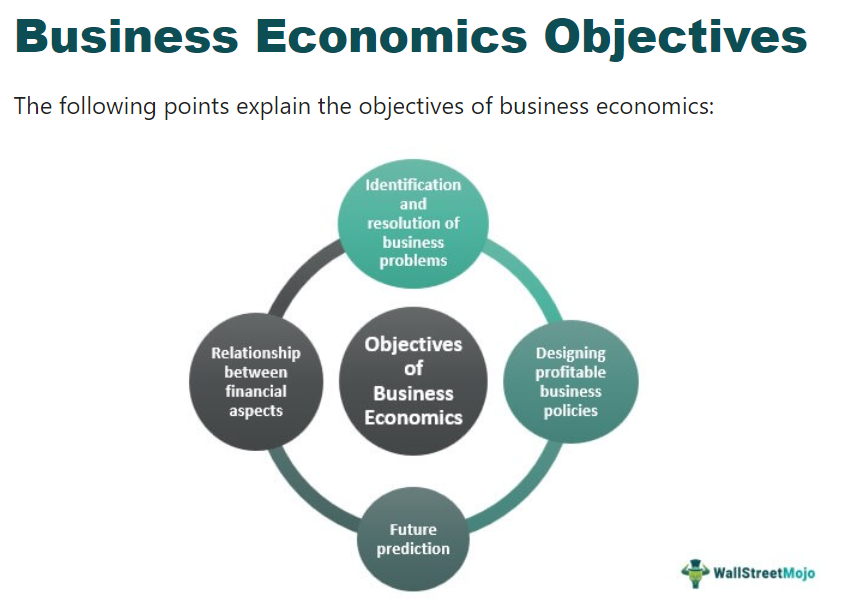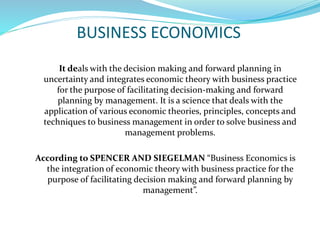Exploring the Influence of Innovation in Business and Economics Currently
Wiki Article
Recognizing Financial Principles for Better Organization Decision-Making
In the complicated landscape of modern-day company, an extensive understanding of economic principles can dramatically boost decision-making procedures. By checking out elements such as market structures and consumer actions, companies can tailor their approaches to align with affordable dynamics and customer requirements. Moreover, insights right into demand elasticity and opportunity expenses provide a structure for enhancing source allocation. Nevertheless, the application of these economic concepts frequently reveals unforeseen difficulties and possibilities that can redefine strategic strategies. What implications do these insights hold for the future of organization technique?The Basics of Economic Theory
Economic theory acts as the structure for comprehending how individuals and organizations choose in the visibility of shortage. At its core, financial theory analyzes the allocation of minimal sources to please unrestricted wants. This basic principle of scarcity requires compromises, compelling decision-makers to evaluate the benefits and expenses connected with different options.Both primary branches of financial theory are macroeconomics and microeconomics. Microeconomics concentrates on individual agents, such as customers and companies, examining their habits and interactions in specific markets. It highlights principles like supply and demand, rate elasticity, and market equilibrium, which are critical for understanding exactly how prices are established and how sources are distributed.
Alternatively, macroeconomics examines the economy in its entirety, addressing broader concerns such as rising cost of living, joblessness, and financial growth. It provides understandings into systemic phenomena that influence all economic agents, guiding policymakers in crafting effective economic approaches.
Eventually, a solid grounding in financial concept is crucial for effective service decision-making. By comprehending the principles of shortage, compromises, and market dynamics, companies can better browse intricate settings and make informed selections that enhance their affordable advantage.
Trick Economic Indicators
Trick financial indicators work as necessary devices for assessing the wellness and instructions of an economic climate, providing valuable insights for service decision-making. These signs are measurable steps that mirror the economic efficiency and can be classified into leading, delaying, and coincident indicators.Leading signs, such as consumer self-confidence indexes and securities market patterns, forecast future economic activity, allowing businesses to prepare for changes in the marketplace. Delaying indicators, like unemployment prices and business earnings, provide insights into the economic situation's previous performance, aiding businesses to evaluate long-lasting fads. Coincident indications, such as GDP development and retail sales, fluctuate simultaneously with the economy, using a real-time photo of financial conditions.
Recognizing these indications enables services to make educated decisions relating to investments, resource allowance, and calculated preparation. By closely checking these crucial economic signs, companies can browse unpredictabilities and place themselves efficiently in the ever-changing financial landscape, inevitably enhancing their decision-making procedures and long-lasting success.

Market Structures and Characteristics
Comprehending market frameworks and dynamics is crucial for services intending to thrive in competitive atmospheres. Market frameworks, generally categorized right into excellent competitors, monopolistic competition, oligopoly, and monopoly, significantly influence prices approaches, item distinction, and competitive actions. Each framework offers distinct difficulties and opportunities that can dictate a company's critical direction.Oligopolies, identified by a couple of dominant players, lead to interdependent decision-making; firms need to very carefully think about rivals' reactions to their activities. Syndicates exist when a solitary company controls the market, resulting in maximum pricing power however usually drawing in regulative scrutiny.
Comprehending these dynamics makes it possible for businesses to prepare for market patterns, adapt methods, and maximize source appropriation. Additionally, identifying just how external aspects like modern technology and law effect these structures can enhance calculated planning. By understanding market structures and characteristics, firms can make informed choices, eventually improving their affordable placement and driving lasting growth.
Customer Behavior Insights
Consumer habits plays a pivotal duty fit organization methods and results. Understanding just how customers make purchasing choices, their preferences, and the aspects affecting their behavior can considerably boost a firm's capacity to fulfill market demands. Secret insights into customer actions can be derived from evaluating demographics, psychographics, and behavior patterns.Group elements such as age, earnings, education, and gender level give a foundational understanding of target audience. Psychographics dig much deeper, exploring consumers' way of lives, values, and perspectives, which can influence brand name commitment and product assumption. Behavior understandings, such as purchasing frequency and response to promos, are vital for customizing advertising and marketing initiatives.
Additionally, outside elements like economic problems, social fads, and technical innovations likewise influence consumer selections. For circumstances, during economic recessions, consumers might prioritize essential products over high-end items, modifying need patterns.
Using Economics to Strategy
Insights got from customer behavior contribute in creating effective service strategies. By leveraging financial principles, companies can better understand learn the facts here now market characteristics, enhance resource allowance, and enhance affordable placing. Examining need flexibility, for example, allows companies to page change pricing techniques to make best use of revenue while remaining attractive to customers.In addition, recognizing market segmentation allows companies to customize their offerings, guaranteeing they fulfill the details needs and choices of diverse customer groups. Business and Economics. This targeted method boosts customer fulfillment and cultivates brand loyalty

Incorporating game concept into critical planning likewise provides insights right into competitive habits, permitting firms to anticipate rival activities and devise counter-strategies effectively.

Final Thought
In conclusion, a comprehensive understanding of financial concepts considerably enhances organization decision-making. By checking out market frameworks, assessing consumer actions, and evaluating essential financial signs, firms can establish efficient techniques that straighten with market demands.In the complex landscape of contemporary business, a Home Page detailed understanding of economic concepts can dramatically improve decision-making procedures.Leading indicators, such as customer confidence indexes and stock market fads, predict future financial activity, enabling businesses to expect adjustments in the market. By carefully monitoring these crucial financial indicators, services can browse uncertainties and position themselves successfully in the ever-changing financial landscape, ultimately improving their decision-making procedures and long-lasting success.
By leveraging financial principles, companies can better recognize market characteristics, optimize source allocation, and improve competitive positioning.In final thought, a comprehensive understanding of economic concepts substantially boosts organization decision-making.
Report this wiki page